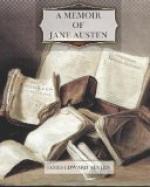Mr. George Austen had lost both his parents before he was nine years old. He inherited no property from them; but was happy in having a kind uncle, Mr. Francis Austen, a successful lawyer at Tunbridge, the ancestor of the Austens of Kippington, who, though he had children of his own, yet made liberal provision for his orphan nephew. The boy received a good education at Tunbridge School, whence he obtained a scholarship, and subsequently a fellowship, at St. John’s College, Oxford. In 1764 he came into possession of the two adjoining Rectories of Deane and Steventon in Hampshire; the former purchased for him by his generous uncle Francis, the latter given by his cousin Mr. Knight. This was no very gross case of plurality, according to the ideas of that time, for the two villages were little more than a mile apart, and their united populations scarcely amounted to three hundred. In the same year he married Cassandra, youngest daughter of the Rev. Thomas Leigh, of the family of Leighs of Warwickshire, who, having been a fellow of All Souls, held the College living of Harpsden, near Henley-upon-Thames. Mr. Thomas Leigh was a younger brother of Dr. Theophilus Leigh, a personage well known at Oxford in his day, and his day was not a short one, for he lived to be ninety, and held the Mastership of Balliol College for above half a century. He was a man more famous for his sayings than his doings, overflowing with puns and witticisms and sharp retorts; but his most serious joke was his practical one of living much longer than had been expected or intended. He was a fellow of Corpus, and the story is that the Balliol men, unable to agree in electing one of their own number to the Mastership, chose him, partly under the idea that he was in weak health and likely soon to cause another vacancy. It was afterwards said that his long incumbency had been a judgment on the Society for having elected an Out-College Man. {5} I imagine that the front of Balliol towards Broad Street which has recently been pulled down must have been built, or at least restored, while he was Master, for the Leigh arms were placed under the cornice at the corner nearest to Trinity gates. The beautiful building lately erected has destroyed this record, and thus ‘monuments themselves memorials need.’
His fame for witty and agreeable conversation extended beyond the bounds of the University. Mrs. Thrale, in a letter to Dr. Johnson, writes thus: ’Are you acquainted with Dr. Leigh, {6} the Master of Balliol College, and are you not delighted with his gaiety of manners and youthful vivacity, now that he is eighty-six years of age? I never heard a more perfect or excellent pun than his, when some one told him how, in a late dispute among the Privy Councillors, the Lord Chancellor struck the table with such violence that he split it. “No, no, no,” replied the Master; “I can hardly persuade myself that he split the table, though I believe he divided the Board."’




